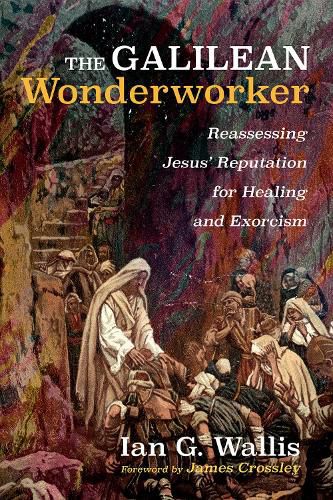Readings Newsletter
Become a Readings Member to make your shopping experience even easier.
Sign in or sign up for free!
You’re not far away from qualifying for FREE standard shipping within Australia
You’ve qualified for FREE standard shipping within Australia
The cart is loading…






This title is printed to order. This book may have been self-published. If so, we cannot guarantee the quality of the content. In the main most books will have gone through the editing process however some may not. We therefore suggest that you be aware of this before ordering this book. If in doubt check either the author or publisher’s details as we are unable to accept any returns unless they are faulty. Please contact us if you have any questions.
What are the origins of Jesus’ reputation for healings and exorcisms? Few questions in Jesus studies are more hotly contested or elicit more diverse responses. Adopting an interdisciplinary approach and in dialogue with recent scholarly literature, The Galilean Wonderworker offers a compelling account. Recognizing the reciprocal relationship between personal and communal well-being within Israelite faith, this study offers new insights into how sickness and healing were understood in first-century Palestine. This, in turn, supplies the backcloth for a fresh evaluation of the evidence for Jesus’ healings and exorcisms, where the emphasis falls firmly upon the dynamics of personal encounter. Jesus emerges as a spirit-person, capable of engendering faith and exercising authority to the extent that sufferers experienced liberation from debilitating symptoms and oppressive behaviors, many of which reflected contemporary sociopolitical conditions. Further, by vesting theological significance in these outcomes, they simultaneously constituted manifestations of God’s sovereign presence, signaling restoration of covenantal well-being. Acknowledging that Jesus expected his disciples to heal and exorcize, the investigation concludes with an overview of how this legacy was embraced by the early church–noting how exorcism becomes incorporated into Christian initiation while spiritual healing, though continuing, is eclipsed by pastoral care and conventional medical practice.
$9.00 standard shipping within Australia
FREE standard shipping within Australia for orders over $100.00
Express & International shipping calculated at checkout
This title is printed to order. This book may have been self-published. If so, we cannot guarantee the quality of the content. In the main most books will have gone through the editing process however some may not. We therefore suggest that you be aware of this before ordering this book. If in doubt check either the author or publisher’s details as we are unable to accept any returns unless they are faulty. Please contact us if you have any questions.
What are the origins of Jesus’ reputation for healings and exorcisms? Few questions in Jesus studies are more hotly contested or elicit more diverse responses. Adopting an interdisciplinary approach and in dialogue with recent scholarly literature, The Galilean Wonderworker offers a compelling account. Recognizing the reciprocal relationship between personal and communal well-being within Israelite faith, this study offers new insights into how sickness and healing were understood in first-century Palestine. This, in turn, supplies the backcloth for a fresh evaluation of the evidence for Jesus’ healings and exorcisms, where the emphasis falls firmly upon the dynamics of personal encounter. Jesus emerges as a spirit-person, capable of engendering faith and exercising authority to the extent that sufferers experienced liberation from debilitating symptoms and oppressive behaviors, many of which reflected contemporary sociopolitical conditions. Further, by vesting theological significance in these outcomes, they simultaneously constituted manifestations of God’s sovereign presence, signaling restoration of covenantal well-being. Acknowledging that Jesus expected his disciples to heal and exorcize, the investigation concludes with an overview of how this legacy was embraced by the early church–noting how exorcism becomes incorporated into Christian initiation while spiritual healing, though continuing, is eclipsed by pastoral care and conventional medical practice.